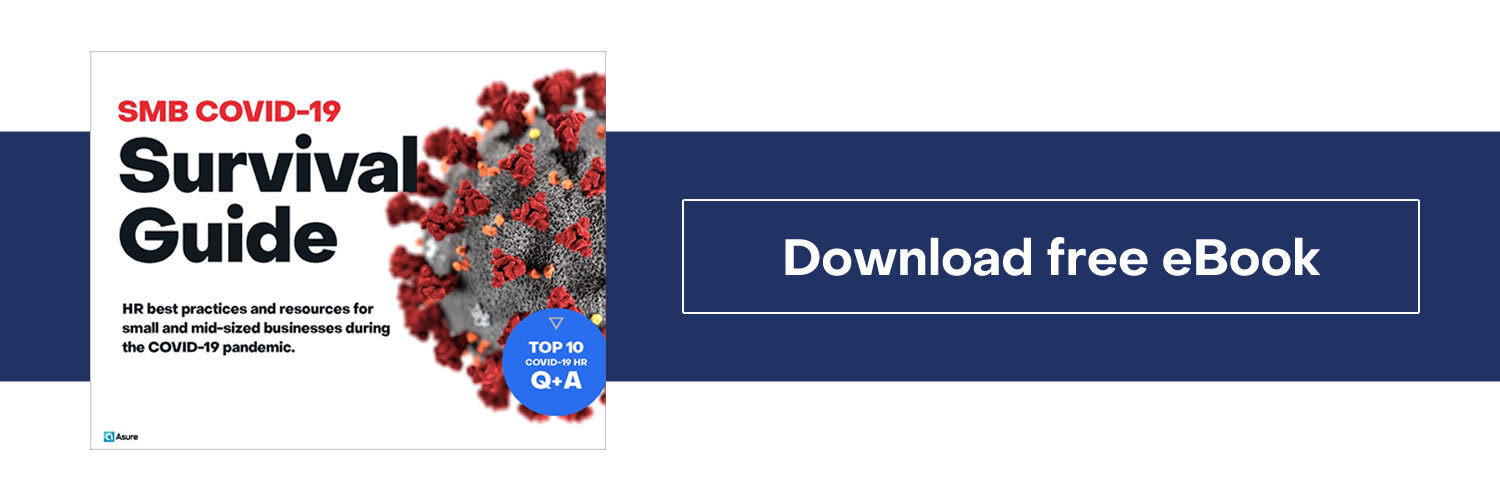Employers should check Federal, State and Municipal guidance often for updates that impact their business and their employees. To help you stay on top of this rapidly evolving situation, Asure has compiled a list of Federal, State, U.S. Territorial, and select Municipality websites with coronavirus updates and guidance.
Throughout this week, federal and state agencies continued to take actions designed to slow the spread of coronavirus, reduce the impact on local healthcare systems, and provide financial assistance to families and businesses economically impacted by COVID-19.
More States Restrict Business and Personal Gatherings
The CDC now recommends that gatherings (other than work) be kept to fewer than 10 people, in an effort to Flatten the Curve of the coronavirus epidemic. More and more states are cancelling school, prohibiting gatherings, and ordering bars and restaurants to close. Some localities have even issued “shelter in place” orders to quarantine all residents.
Employers should check Federal, State and Municipal guidance often for updates that impact their business and their employees. To help you stay on top of this rapidly evolving situation, Asure has compiled a list of Federal, State, U.S. Territorial, and select Municipality websites with coronavirus updates and guidance.
Families First Coronavirus Response Act Becomes Law
The Senate passed the Families First Coronavirus Response Act on Wednesday night and the President signed it. It will require businesses to provide 10 days (80 hours) of paid sick leave to full- or part-time workers, regardless of tenure, who are impacted in one of several ways by the COVID-19 pandemic. Now that the President signed it, this becomes law in just 15 days, so employers need to make sure they are ready to make changes quickly.
The law will apply to private companies with up to 500 employees and all public companies.
According to National Law Review, to qualify for the paid emergency sick leave, a worker must be unable to work (or telework) due to:
-
being subject to a Federal, State, or local quarantine or isolation order related to COVID-19;
-
being advised by a health care provider to self-quarantine due to concerns related to COVID-19;
-
experiencing symptoms of COVID-19 and seeking a medical diagnosis;
-
caring for an individual who is self-isolating because of a COVID-19 diagnosis, or is experiencing symptoms and is seeking a medical diagnosis;
-
caring for a son or daughter if the son or daughter’s school or place of care has been closed, or the child care provider of such son or daughter is unavailable, due to COVID-19; or
-
experiencing any other substantially similar condition specified by the Secretary of Health and Human Services.
The Families First Act also delivers $1 billion in food aid to the needy and $1 billion in unemployment funds to states.
More Aid Packages Being Considered
The White House has asked Congress to consider approval for a plan to send two rounds of $1,000 checks to Americans in need, beginning in early April. This would provide additional relief for employees who have been thrown out of work, had hours reduced, or are earning fewer tips during the pandemic.
Help should soon be on the way for businesses, too. The Senate is working on a large aid package with the intention of helping small business owners. The White House is looking at plans to provide help to the hardest hit industries, like airlines, cruise ships, and restaurants.
Federal Reserve Makes Big Moves
Additionally, the Federal Reserve Board has been taking unprecedented steps to try to mitigate the economic damage wrought by pandemic uncertainty, including lowering interest rates, starting a new round of Quantitative Easing, and taking additional actions to provide financial markets and the financial sector with liquidity.

